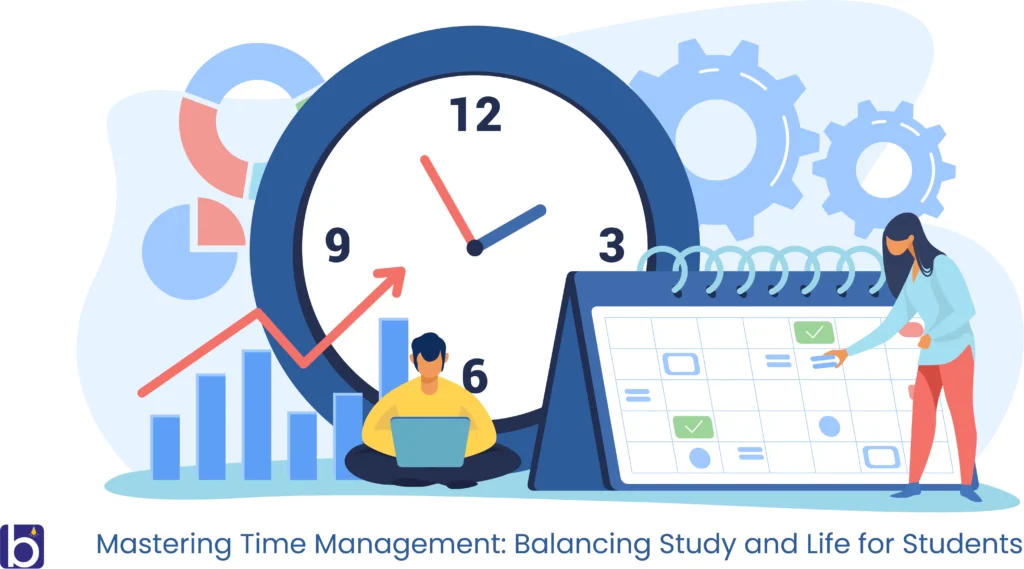19 Time Management Tips: Balancing Study and Life for Students
In today’s fast-paced world, students often find themselves overwhelmed by the sheer volume of responsibilities they have to juggle. Balancing study and life can feel like a daunting task, but mastering time management is the key to success. Whether you’re in high school, college, or pursuing higher education, learning how to manage your time effectively is crucial for academic achievement, personal growth, and overall well-being.
As a student, you might have experienced the stress of deadlines, the pressure of exams, and the constant struggle to find time for social activities, hobbies, and self-care. The good news is that you’re not alone in this journey. Many students face similar challenges, and with the right strategies, you can overcome them. This guide will provide you with practical time management tips that will help you create a balance between your academic responsibilities and your personal life, enabling you to thrive both in and out of the classroom.

1. Understanding the Importance of Time Management
Time management is the cornerstone of balancing study and life. Without a clear understanding of how to allocate your time effectively, you may find yourself constantly stressed and unable to meet your goals. Time management is not just about creating schedules; it’s about prioritizing tasks, setting realistic goals, and making time for what truly matters.
When you manage your time well, you gain control over your day, reduce stress, and increase your productivity. This allows you to dedicate adequate time to your studies while still enjoying your personal life. Effective time management also fosters discipline and helps you develop a strong work ethic, which are essential skills for success both during and after your academic career.
2. Setting Clear Goals for Academic Success and Personal Fulfillment
o balance study and life effectively, it’s essential to set clear goals. Your goals should be specific, measurable, achievable, relevant, and time-bound (SMART). For example, instead of setting a vague goal like “I want to do well in my exams,” you could set a specific goal like “I want to achieve an A in my math exam by studying for two hours every day for the next three weeks.”
By setting clear goals, you give yourself a roadmap to follow, making it easier to allocate your time and resources effectively. It’s important to set goals not only for your academic success but also for your personal fulfillment. This might include goals related to hobbies, social activities, or self-care practices.
3. Prioritizing Tasks with the Eisenhower Matrix
One of the most effective time management techniques for students is the Eisenhower Matrix, which helps you prioritize tasks based on their urgency and importance. The matrix is divided into four quadrants:
- Urgent and Important: Tasks that require immediate attention, such as approaching deadlines or exam preparation.
- Important but Not Urgent: Tasks that contribute to long-term goals, like studying regularly or working on a term paper.
- Urgent but Not Important: Tasks that need to be done quickly but are not crucial, like responding to certain emails.
- Not Urgent and Not Important: Tasks that can be postponed or even eliminated, like excessive social media browsing.
By categorizing your tasks using the Eisenhower Matrix, you can focus on what’s truly important and avoid getting caught up in activities that don’t contribute to your overall success. This approach is vital for balancing study and life, as it ensures you’re dedicating time to both academic responsibilities and personal interests.
4. Creating a Balanced Study Schedule
A well-planned study schedule is a cornerstone of effective time management. When creating your schedule, consider your energy levels throughout the day and allocate study sessions accordingly. For example, if you’re more alert and focused in the morning, plan to study your most challenging subjects during that time.
It’s also important to schedule regular breaks to avoid burnout. The Pomodoro Technique, which involves studying for 25 minutes followed by a 5-minute break, is a popular method that helps maintain focus and productivity. Additionally, make sure to include time for extracurricular activities, socializing, and relaxation in your schedule. A balanced study schedule allows you to manage your academic workload while still enjoying your personal life.
5. Avoiding Procrastination: The Student’s Greatest Enemy
Procrastination is one of the biggest obstacles to effective time management and balancing study and life. It’s easy to put off tasks, especially when they seem overwhelming or tedious. However, procrastination often leads to last-minute cramming, increased stress, and lower-quality work.
To combat procrastination, try breaking down large tasks into smaller, more manageable steps. For example, instead of telling yourself you need to write a 10-page paper, focus on writing one page at a time. Setting deadlines for each step can also help keep you on track.
Another effective strategy is to use the “two-minute rule.” If a task will take less than two minutes to complete, do it immediately. This helps prevent small tasks from piling up and becoming overwhelming.
Related Topic: 6 Tips to Overcoming Procrastination
6. Utilizing Technology for Time Management
In today’s digital age, numerous tools and apps can help you manage your time more effectively. Apps like Todoist, Trello, and Google Calendar allow you to create to-do lists, set reminders, and organize your tasks. These tools can be particularly helpful for students who need to balance multiple responsibilities, such as classes, assignments, and extracurricular activities.
Time management apps can also help you stay on top of deadlines and avoid forgetting important tasks. By setting reminders and notifications, you can ensure that you’re always aware of upcoming deadlines and can plan your time accordingly.
7. The Role of Self-Care in Time Management
Balancing study and life isn’t just about managing your academic responsibilities; it’s also about taking care of your physical and mental well-being. Self-care plays a crucial role in effective time management because it ensures that you have the energy and focus needed to tackle your tasks.
Make sure to include self-care activities in your daily schedule, such as exercise, meditation, or simply taking a walk. Prioritizing sleep is also essential; studies have shown that getting enough rest improves cognitive function, memory, and overall academic performance.
Remember, taking time for yourself isn’t a luxury—it’s a necessity. When you’re well-rested and mentally refreshed, you’re more productive and better equipped to handle the demands of student life.
Related Topic: 5 Time Management Secrets Every Entrepreneur Should Know
8. Building a Support System
Balancing study and life can be challenging, but you don’t have to do it alone. Building a support system of friends, family, and mentors can make a significant difference in your ability to manage your time effectively. These individuals can offer advice, encouragement, and accountability when you need it most.
Don’t hesitate to reach out for help if you’re struggling with time management. Whether it’s asking a classmate for study tips or talking to a counselor about stress management, seeking support can help you stay on track and maintain a healthy balance between your academic and personal life.
9. Learning to Say No: Protecting Your Time
One of the most important time management skills is learning to say no. As a student, you may be tempted to take on too many commitments, from extracurricular activities to social events. While it’s important to be involved and engaged, overcommitting can lead to burnout and make it difficult to balance study and life.
When faced with new opportunities or requests, consider whether they align with your goals and priorities. If not, it’s okay to say no. Protecting your time is crucial for maintaining a healthy balance and ensuring that you’re able to focus on what’s most important to you.
10. Practicing Mindfulness and Focus
In a world full of distractions, maintaining focus is key to effective time management. Practicing mindfulness can help you stay present and concentrate on the task at hand. Mindfulness techniques, such as deep breathing exercises or meditation, can help reduce stress and improve your ability to focus.
When you’re studying or working on assignments, try to eliminate distractions as much as possible. This might mean turning off your phone, finding a quiet study space, or using apps like Focus at Will that play music designed to enhance concentration. By staying focused, you’ll be able to complete tasks more efficiently and have more time for other activities.
11. Balancing Academic and Personal Goals
Achieving a balance between your academic and personal goals is essential for overall well-being. While academic success is important, it’s equally important to pursue personal interests and hobbies. These activities provide a sense of fulfillment and relaxation, which can enhance your academic performance by reducing stress and improving your mood.
Set aside time each week to engage in activities you enjoy, whether it’s playing a sport, practicing a musical instrument, or spending time with friends. By balancing your academic and personal goals, you’ll create a more well-rounded and satisfying life.
12. Managing Stress Through Effective Time Management
Stress is a common issue for students, especially when trying to balance study and life. However, effective time management can significantly reduce stress levels. By staying organized, setting realistic goals, and prioritizing tasks, you can prevent the last-minute rush that often leads to stress.
In addition to managing your time, it’s important to develop healthy coping mechanisms for stress. This might include regular exercise, meditation, or talking to a trusted friend or counselor. By managing stress effectively, you’ll be better equipped to handle the demands of student life without becoming overwhelmed.
13. The Power of Routine in Time Management
Establishing a daily routine can greatly improve your time management skills. A routine provides structure to your day, making it easier to plan and allocate time for various activities. When you have a consistent routine, you’re less likely to waste time and more likely to stay on track with your goals.
Your routine should include time for studying, attending classes, and engaging in extracurricular activities, as well as time for self-care and relaxation. By sticking to a routine, you’ll develop good habits that will support your academic success and help you maintain a healthy balance between study and life.
14. Overcoming the Fear of Missing Out (FOMO)
The fear of missing out (FOMO) can be a significant barrier to effective time management. As a student, you might feel pressure to attend every social event or participate in every activity, even if it means sacrificing study time. However, constantly giving in to FOMO can lead to burnout and negatively impact your academic performance.
It’s important to recognize that you can’t do everything, and that’s okay. Focus on what truly matters to you and what aligns with your goals. By overcoming FOMO and making intentional choices about how you spend your time, you’ll be better able to balance study and life.
15. Staying Motivated with the Right Mindset
Maintaining motivation is essential for effective time management and balancing study and life. When you’re motivated, you’re more likely to stick to your schedule, complete tasks on time, and stay focused on your goals. However, motivation can sometimes wane, especially when faced with challenging tasks or setbacks.
To stay motivated, remind yourself of why your goals are important. Visualize the outcomes you want to achieve, whether it’s graduating with honors, landing your dream job, or simply feeling accomplished at the end of the day. Surround yourself with positive influences, such as supportive friends or inspirational quotes, to keep your motivation levels high.
16. Flexibility in Time Management
While having a schedule and routine is important, it’s equally important to remain flexible. Unexpected events or challenges may arise that require you to adjust your plans. Flexibility allows you to adapt to changes without becoming stressed or overwhelmed.
When your schedule needs to change, try to view it as an opportunity to reassess your priorities and make necessary adjustments. By being flexible, you can maintain balance and continue to manage your time effectively, even in the face of unexpected circumstances.
17. The Role of Reflection in Time Management
Reflection is a powerful tool for improving your time management skills. At the end of each day or week, take some time to reflect on how you spent your time. Did you accomplish your goals? Were there areas where you could have been more efficient? What worked well, and what could be improved?
By reflecting on your time management practices, you can identify patterns and make adjustments as needed. This ongoing process of reflection and adjustment will help you continually improve your ability to balance study and life.
18. Leveraging Study Groups for Time Management
Study groups can be a valuable resource for time management, especially when balancing study and life. By studying with peers, you can share knowledge, stay motivated, and hold each other accountable. Study groups also provide an opportunity to collaborate and discuss challenging topics, making the study process more efficient.
However, it’s important to ensure that your study group stays focused and productive. Set clear goals for each session and establish guidelines to minimize distractions. By leveraging study groups effectively, you can make the most of your study time and create more space for other activities in your life.
19. Planning for Long-Term Success
Effective time management isn’t just about getting through the day or week—it’s about planning for long-term success. This means setting goals for the entire semester or academic year and creating a plan to achieve them. Long-term planning allows you to break down larger goals into smaller, manageable steps, making it easier to stay on track.
For example, if your goal is to graduate with honors, you’ll need to plan your study schedule, assignments, and exam preparation well in advance. By planning for the long term, you can ensure that you’re always moving toward your goals, even when balancing multiple responsibilities.
Conclusion
Balancing study and life is a challenge that every student faces, but with the right time management strategies, it’s entirely possible to achieve success in both areas. By setting clear goals, prioritizing tasks, creating a balanced schedule, and practicing self-care, you can take control of your time and create a fulfilling and productive life.
Remember, time management is a skill that takes practice, and it’s okay to make adjustments along the way. Stay motivated, remain flexible, and don’t be afraid to seek support when needed. By mastering time management, you’ll not only excel academically but also enjoy a rich and rewarding personal life.






